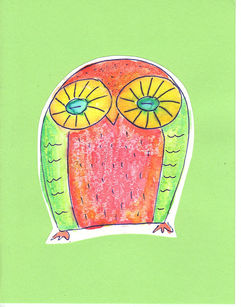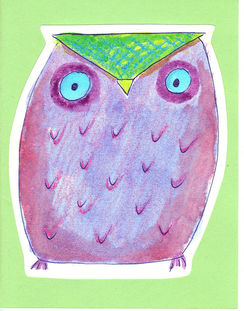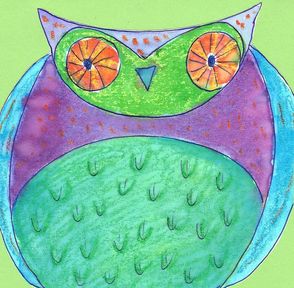Deadline Monster Ravages ManuscriptWell, it’s official as of two days ago: I did not make the deadline to submit my young adult novel per the general open submission opportunity provided by the NESCBWI. Bummer! :( This seemed like a reasonable goal several months ago. Before I noted that my book was way too long and decided to cut it in half, requiring a lot of re-plotting. Before I read Lisa Cron’s Wired for Story and it kicked my butt (in a good way) and showed me SO MANY things I still needed to do. Before I realized that I was revising a 40-chapter book at the rate of about half a chapter per day. So, no. Did not finish in time for the deadline. Or even remotely close to it. It’s disappointing, but it’s fine. I can regroup. Other opportunities await! My bigger concern is that pushing myself to make the deadline seemed to pummel all the joy out of the writing process. I know there are times when writing is not fun, but if I don’t enjoy writing overall, then why would I do it? And is the deadline the monster that destroyed my writing happy place? I think the answer is yes. Whenever I put pressure on myself to do something, the more pressure is applied, the less fun the activity or project becomes. Some people love that down-to-the-wire adrenaline, and become very motivated. For me, it's the opposite. I do less and less and get more and more unhappy with not only the project that's pushing at me, but everything else in my life as well. Things get out of balance. What once was fun is now another form of stress. Bleh. But having deadlines has also made me more productive. Real deadlines are a new thing for me, starting from a few months ago. Before that, besides Camp NaNoWriMo word counts, I mostly meandered around with vague goals that were rarely met due to truly horrible first book attempts that required long months of regrouping, and the fact that writing a book takes WAY LONGER TO WRITE THAN YOU COULD EVER IMAGINE. (At least for some of us, apparently.) This new way of pushing myself to meet deadlines based on conference/workshop dates and submission deadlines has resulted in tremendous progress in the last few months. But was it worth it if the writing process was so sloggy? My book has been a form of play for me for years, something fun(ish) to do outside of my real job. I have worried that trying to make it into my main job would take it from being play into, well, work. Un-fun. So now what I’m wondering, as I try to find the flow and engagement of pre-deadline writing: Is the ONLY difference between play and work a deadline? And if so, are there ways to meet in the middle and find a deadline that gets the work done but allows you do not have it hovering over your shoulder like an annoying little brother? That’s my new goal, then. To pick a deadline that is reasonably possible, and to make it just far enough away that it’s not THE ONLY THING I CAN THINK ABOUT when I’m writing. I guess, just like so many things in life, it all comes down to balance. Yay for Day Jobs! As I say goodbye to my current job to spend a few months (or more!) writing full time, I've been thinking about the pros of working at jobs that seem to have nothing directly to do with writing. Besides the very obvious benefits--food in stomach, roof over head, insurance card in wallet--there do seem to be a lot of useful lessons buried in these various jobs that are directly applicable to my current writing adventure. Sometimes you just have to take a leap of faith As I take a leap into the unknown right now, I'm reminded of my first "real" job, which was teaching English in Japan at a conversation school. When I was offered this opportunity, I didn't have a teaching degree or experience, had no idea if I could manage living in a foreign country where I didn't speak the language, and was adding to my already considerable debt load to buy the plane ticket and manage my first year of living expenses. Was it scary? Yup! Was it crazy? Probably! But while I worried about failing (a lot!), I was more worried about not even trying, about missing out on what might be a great opportunity. And you know what? I ended up staying in Japan for nine years working at a little school in Hokkaido. I paid off all my debts, including my student loans, and learned to speak Japanese (more or less). And most importantly, I met the most lovely and amazing children and adults and had a blast collaborating with them in our English classes. I've taken other "leaps" that didn't work out as well (please see my previous blog, Transplanted Ivy), but I'm still glad I tried. Whatever comes of this newest dive into the unknown, I can know that while sometimes things don't seem to go as planned, sometimes they turn out even better. And no matter what, there are always new experiences and adventures out there that can only be encountered when we are willing to let go of what seems safe and try something new. It's only impossible until you do it As I now tackle revising an entire book that seems to need even more revising the more I work on it, I keep in mind another seemingly impossible task at another job I had when I came back from Japan. I was hired as a case manager and teacher for adults with developmental disabilities. After living and working in another country, I would have expected more fortitude from myself about trying a new career out, even without experience. But in Japan, my job was often comprised of fun stuff like making up games and songs and stories. This new job involved paperwork. A lot of paperwork. Maybe that doesn't sound like a big deal to you, but, hey, we all have our hurdles, and spreadsheets and analytical report writing were mine. The first time I had to write a quarterly summary for one of my clients, I was staying late at work, all alone, the rest of the office dark and quiet, and...I cried. I cried through that whole stupid summary. It's embarrassing to admit it now, because it seems so dramatic and unnecessary to CRY over writing a REPORT! But I did. I also got through it. And the next one, and the next. And though it took several years to get organized with it all, I eventually did. And I'm so glad that I did, because if I hadn't pushed myself and learned that I can do way more than I thought, I would have missed out on meeting some of the coolest and most unique people with whom I've ever had the chance to work. And dance. There was lots of dancing :) So I this is what I can hold in mind when I encounter parts of being a writer that seem way more daunting than I was expecting (like stepping into the world of freelancing...so far, lots of echoes of that long ago report!). "It always seems impossible until it's done" according to Nelson Mandela, and I would add that if you just try what seems impossible, just in trying, the hardest part is often behind you. It's all in your attitude I recently read a post that was meant, I think, to be encouraging to writers. The writer exclusively referred to the writing process as something that is awful. "It sucks," she wrote, over and over. I kept waiting for a glimmer of positivity, but the writer stuck with her theme that writing is so hard and so awful and that's okay because that's how it's supposed to be. I understand that she was attempting to connect with her readers through the shared reality of how challenging writing is, but it makes me wonder: If writing really seems to be that awful to her, then why would she want to do it? It also makes me wonder: What kind of day jobs has she had? Like most of us, I've had some stinkers. And while I can look for the silver linings, the learning experiences and the characters I met, the thing that I can draw right now from these not-so-perfect work experiences is perspective. My definition of jobs that "suck" applies more to things like answering phones and having caller after caller dump their frustration on me. Or working at a restaurant and being short-staffed and having the hostess seat three of my tables at one time. Or, worst of all: data entry. Having these jobs for comparison is a gift. These jobs provide me with perspective that can help remind me that even in the lowest writing moments, there are way worse things out there than not knowing how to start or end a chapter. If I start to think sloggy thoughts about what I'm writing, I can stop and ask myself, "Is this really so bad, or am I just caught in a cycle of perfectionism or being deadline obsessed?" And if that doesn't work, I can spend a few moments imagining that I'm doing data entry, and that should do the trick quite nicely! I don't disagree that writing is hard. Occasionally maddening. And yes, I might go low enough at times to agree with the "it sucks" writer. But it also often engaging, and sometimes it's even...fun! Yes! it is! I'll say it and I don't care who knows it! :) So thank you, Day Jobs past (and probably future!) for making this all work, and for giving hope, teaching perseverance, and keeping things in perspective! NESCBWI Agent/Editor Day in Devens MAOctober 27, 2018: I'm so excited to have attended my first Society of Children's Book Writers and Illustrators (SCBWI) event! Karen Boss (Charlesbridge Publishing) presented the mini-keynote about motivation and encouraged us to take risks earlier and not worry about what other people think when we are doing work outside the box. The main part of the day was working in small groups (eight writers) paired with either an editor or agent. Using text from the two chapters introducing my two main characters, I got great feedback from my groups and the professionals facilitating the groups, author/agent Rebecca Podos, and editor Lindsay Warren. It was an amazing atmosphere, supportive and open. Now it's time for me to take the feedback and positive energy and use it to get my book ready for submission by the end of December! :) Polyvagal Theory in WritingOctober 13, 2018: I attended the Maine Writers and Publishers Alliance workshop called Seize the Reader with Jennifer Jacobson, author of fiction for children and young adults, including The Dollar Kids (jenniferjacobson.com). Also, check out Deb Dana's The Polyvagal Theory in Therapy for more information on Polyvagal Theory (debdanalcsw.com). **Please note that Jennifer has graciously allowed me to post this information, and that is only a dollop of the information presented in her wonderful workshop. For more on this and other ways to make your novel sing, I highly recommend attending one of her workshops! At the start of our workshop, I was surprised that Jennifer Jacobson handed out worksheets on Polyvagal Theory. Polyvagal Theory a way of explaining the reaction of our nervous systems when exposed to stress/trauma. As a trauma survivor, I am familiar with Polyvagal Theory, both the tidy formal explanations, and the much less tidy emotional and physical responses that those of us dealing with the aftermath of trauma experience. But what does Polyvagal Theory have to do with writing? The connection, Jennifer explained, is in learning to understand and utilize our emotional responses to make us better writers. We know that good writing is about creating an emotional connection for the reader. If the reader is not emotionally invested in what we are writing, then we are going to lose them. Jennifer led the workshop in steps to show us that in order to write emotionally truthfully, it is necessary to for the writer to be engaged emotionally when writing. Specifically, writers need to feel the sadness of the moment when they are writing a scene where their main character is sad. We need to feel the character's anxiety if we are writing a scene where that character is anxious. This is where understanding Polyvagal Theory can be helpful, because it can provide a map for us when trying to slip in and out of these emotional states. At a quick summary, there are three basic states of our nervous system (encompassing our sympathetic and our parasympathetic nervous systems): 1) VENTRAL VAGAL: We feel safe, social, at home. We can think clearly, sleep well, have fun. 2) SYMPATHETIC: Fight/flight response. We can't eat or sleep, are hyper alert for danger. 3) DORSAL VAGAL: Freeze response. We shut down, feel hopeless, collapsed. Can't focus. Jennifer had us list out what sorts of events each of us had for triggers for these different states (but she didn't make us share them!) and then she asked us to think of our main character and list out what would make them feel safe and at home, what would make them scared and ready to run, and what what make them feel hopeless and unable to act. Additionally, we considered what would move the us and our characters in and out of these states. For example, one of my main characters often feels trapped by her life circumstances, which can take her out of Ventral Vagal and move her all the way down to Dorsal Vagal. So then my dilemma as a writer is to understand what would bring her back up again to a safe place, or at least to Sympathetic, where she might not feel happy, but at least she can take action. Coffee? She loves a good latte. Would that be enough? Probably not. I will need to get right down there with her and feel her pain and see the world through her eyes and write her back up, through Sympathetic, and finally to Ventral Vagal. (Spoiler alert: my main characters don't get to spend a lot of time in Ventral Vagal!) I love Jennifer's ideas, but writing has often been my happy place--my own personal doorway to the Ventral Vagal state--so I wasn't initially happy to be told that I need to deliberately move out of my happy place to write certain kinds of emotions. However, since I've been noting my emotional state when I write, I can see that I do follow my characters' emotional ups and downs fairly closely, and I'm thankful to report that slipping around the sympathetic and parasympathetic nervous system when I write is not the same roller coaster as my own personal trauma journey! It can even be rather cathartic!!
|






 RSS Feed
RSS Feed
